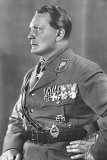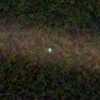
Dr. Gilbert
| Terrorism against our nation will not stand. -- George W. Bush |
| |||
About four weeks later we invaded Afghanistan and in a year and a half we invaded Iraq. Did the American people want that? Some say that 70% of us did.

Dr. Gilbert |

Reichsmarschall Göring |
Here's an exchange that occurred sometime around 1947 when
American military psychologist, Gustave Mark Gilbert, was sent to the Nuremberg trials after the war
and spoke with Hitler's number one Nazi officer, Hermann Göring.
Reichsmarschall Göring: Why, of course, the people don't want war. Why would some poor slob on a farm want to risk his life in a war when the best that he can get out of it is to come back to his farm in one piece? Naturally, the common people don't want war; neither in Russia, nor in England, nor in America, nor for that matter in Germany. That is understood. But, after all, it is the leaders of the country who determine the policy and it is always a simple matter to drag the people along, whether it is a democracy, or a fascist dictatorship, or a parliament, or a communist dictatorship.Dr. Gilbert: There is one difference. In a democracy the people have some say in the matter through their elected representatives, and in the United States only Congress can declare wars.
Reichsmarschall Göring: Oh, that is all well and good, but, voice or no voice, the people can always be brought to the bidding of the leaders. That is easy. All you have to do is tell them they are being attacked, and denounce the pacifists for lack of patriotism and exposing the country to danger. It works the same way in any country.

| This album art was done before the attack and the group took a little criticism for it. |
Watch:
|
 Look again at that dot. That's here. That's home. That's us. On it
everyone you love, everyone you know, everyone you ever heard of, every
human being who ever was, lived out their lives. The aggregate of our
joy and suffering, thousands of confident religions, ideologies, and
economic doctrines, every hunter and forager, every hero and coward,
every creator and destroyer of civilization, every king and peasant,
every young couple in love, every mother and father, hopeful child,
inventor and explorer, every teacher of morals, every corrupt
politician, every "superstar," every "supreme leader," every saint and
sinner in the history of our species lived there -- on a mote of dust
suspended in a sunbeam.
Look again at that dot. That's here. That's home. That's us. On it
everyone you love, everyone you know, everyone you ever heard of, every
human being who ever was, lived out their lives. The aggregate of our
joy and suffering, thousands of confident religions, ideologies, and
economic doctrines, every hunter and forager, every hero and coward,
every creator and destroyer of civilization, every king and peasant,
every young couple in love, every mother and father, hopeful child,
inventor and explorer, every teacher of morals, every corrupt
politician, every "superstar," every "supreme leader," every saint and
sinner in the history of our species lived there -- on a mote of dust
suspended in a sunbeam.
The Earth is a very small stage in a vast cosmic arena. Think of the rivers of blood spilled by all those generals and emperors so that, in glory and triumph, they could become the momentary masters of a fraction of a dot. Think of the endless cruelties visited by the inhabitants of one corner of this pixel on the scarcely distinguishable inhabitants of some other corner, how frequent their misunderstandings, how eager they are to kill one another, how fervent their hatreds.
Our posturings, our imagined self-importance, the delusion that we have some privileged position in the Universe, are challenged by this point of pale light. Our planet is a lonely speck in the great enveloping cosmic dark. In our obscurity, in all this vastness, there is no hint that help will come from elsewhere to save us from ourselves.
The Earth is the only world known so far to harbor life. There is nowhere else, at least in the near future, to which our species could migrate. Visit, yes. Settle, not yet. Like it or not, for the moment the Earth is where we make our stand.
It has been said that astronomy is a humbling and character-building experience. There is perhaps no better demonstration of the folly of human conceits than this distant image of our tiny world. To me, it underscores our responsibility to deal more kindly with one another, and to preserve and cherish the pale blue dot, the only home we've ever known.
-- Carl Sagan, Pale Blue Dot, 1994
| Climate Change | World Trade Center | Bleeding heart liberal stuff | Free speech | One Nation under God | Amusing stuff | What about sex? |